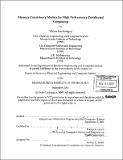| dc.contributor.advisor | Nancy A. Lynch. | en_US |
| dc.contributor.author | Luchangco, Victor | en_US |
| dc.contributor.other | Massachusetts Institute of Technology. Department of Mechanical Engineering. | en_US |
| dc.date.accessioned | 2014-05-07T17:04:53Z | |
| dc.date.available | 2014-05-07T17:04:53Z | |
| dc.date.copyright | 2001 | en_US |
| dc.date.issued | 2001 | en_US |
| dc.identifier.uri | http://hdl.handle.net/1721.1/86772 | |
| dc.description | Thesis (Sc. D.)--Massachusetts Institute of Technology, Dept. of Mechanical Engineering, 2001. | en_US |
| dc.description | Includes bibliographical references (p. 195-205) and index. | en_US |
| dc.description.abstract | This thesis develops a mathematical framework for specifying the consistency guarantees of high performance distributed shared memory multiprocessors. This framework is based on computations, which specify the operations requested and constraints on how these operations may be applied; we call the framework computation-centric. This framework is expressive enough to specify high level synchronization mechanisms such as locks. We use the computation-centric framework to specify and compare several memory models, to characterize programming disciplines, and to prove that weakly consistent systems provide strong consistency guarantees when certain programming disciplines are obeyed. Specifically, we define computation-centric versions of several memory models from the literature, including sequential consistency, weak ordering and release consistency, and we give a computation-centric characterization of data-race-free programs. We prove that when running data-race-free programs, weakly ordered systems appear sequentially consistent. We also define memory models that have higher level guarantees such as locks and transactions. | en_US |
| dc.description.abstract | (cont.) The strongly consistent versions of these models make guarantees that are stronger than sequential consistency, and thus are easier for programmers to use. We introduce a new model called weak sequential locking, which has very weak guarantees, and prove that it guarantees sequential consistency and mutually exclusive locking for programs that protect memory accesses using locks. We also show that by using two-phase locking, programmers can implement serializable transactions on any memory system with weak sequential locking. The framework is intended primarily to help programmers of such systems reason about their programs. It supports a high level of abstraction, insulating programmers from system details and enhancing the portability of their programs. The framework is also useful for implementors of such systems, in determining what guarantees their implementations provide and in assessing the advantages of providing one memory model rather than another. | en_US |
| dc.description.statementofresponsibility | by Victor Luchangco. | en_US |
| dc.format.extent | 212 p. | en_US |
| dc.language.iso | eng | en_US |
| dc.publisher | Massachusetts Institute of Technology | en_US |
| dc.rights | M.I.T. theses are protected by copyright. They may be viewed from this source for any purpose, but reproduction or distribution in any format is prohibited without written permission. See provided URL for inquiries about permission. | en_US |
| dc.rights.uri | http://dspace.mit.edu/handle/1721.1/7582 | en_US |
| dc.subject | Mechanical Engineering. | en_US |
| dc.title | Memory consistency models for high performance distributed computing | en_US |
| dc.type | Thesis | en_US |
| dc.description.degree | Sc.D. | en_US |
| dc.contributor.department | Massachusetts Institute of Technology. Department of Mechanical Engineering | |
| dc.identifier.oclc | 49837339 | en_US |
